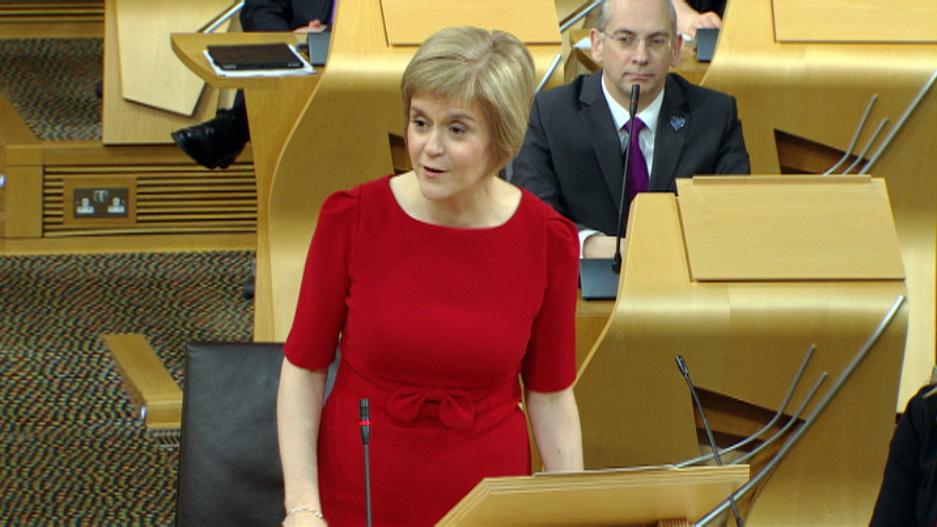'Radical' Scottish land reform announced
- Published
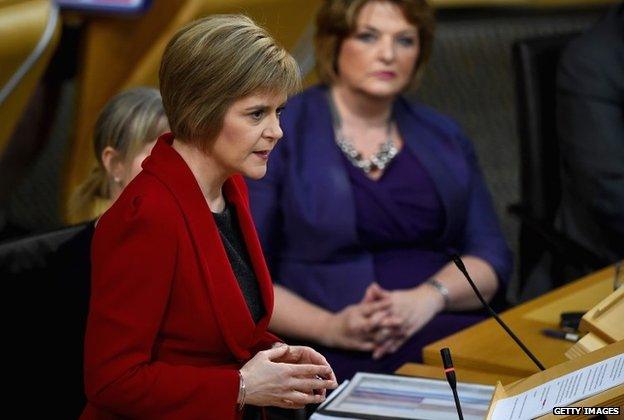
Nicola Sturgeon announced her programme for government in the Scottish Parliament
Scottish First Minister Nicola Sturgeon has announced plans to take action against landowners who pose a "barrier" to development.
She also said business rate exemptions for shooting and deerstalking estates would be scrapped as part of a series of "radical" land reforms.
The body which represents landowners criticised the move.
It came as Ms Sturgeon announced her government's plans and new legislation for the year ahead.
It listed 12 new pieces of proposed legislation, as well as a commitment to re-visit alternatives to council tax, which has been frozen in Scotland since 2007.
The government's plans for a Land Reform Bill would allow ministers to intervene "where the scale of land ownership or the conduct of a landlord is acting as a barrier to sustainable development".
Ms Sturgeon said the ending of rates exemptions for shooting and deerstalking estates, "put in place by the Tories in 1994 to protect the interests of major landowners", would pay for an increase in the fund which supports community land ownership from £3m to £10m a year.
"Scotland's land must be an asset that benefits the many, not the few," said Ms Sturgeon.
However David Johnstone, chairman of Scottish Land and Estates, which speaks for private landowners, said they were already working hard to back Scottish government aims, like as renewable energy, agriculture, housing and tourism.
He said: "Sporting estates are too readily singled out in a negative light, when in fact they are businesses that make a key contribution to rural tourism, local employment and the environment."
Elsewhere, Ms Sturgeon announced:
A Community Charge Debt Bill to end collection of debts from non-payment of the poll tax.
An Education Bill to give new rights to children who may have additional support needs.
A Higher Education Governance Bill to ensure the governing bodies of universities are more transparent.
A Public Health Bill to reduce the availability of tobacco and electronic cigarettes.
A Carers' Bill to increase support for those looking after relatives or loved ones and give them a say in delivery of services they use.
A Human Trafficking and Exploitation Bill to clarify the rights of victims and strengthen the ability of the authorities to help them.
As well as legislation, Ms Sturgeon said an independent commission to examine "fairer" alternatives to council tax would begin work in early 2015 and report by autumn next year.
She also set a target to increase the number of students from poorer backgrounds in higher education, saying at least 20% of university entrants should come from the most deprived 20% of the population.
And the first minister said the Scottish government would consult on creating a specific offence of domestic abuse, as well as the possibility of legislation to tackle "revenge porn", the practice of posting intimate photos of people online without their consent.

ANALYSIS
By Brian Taylor, BBC Scotland political editor
Nicola Sturgeon said in advance - not least at the SNP conference - that her aim was to balance the search for social justice with pursuing economic growth.
She said again today in presenting her programme for government that she wanted to achieve "participation, prosperity and fairness".
Perhaps inevitably, it is the rhetoric about fairness and distribution which comes to the fore.
That is partly because it is more eye-catching and ear-grabbing to talk about helping the poor than to calibrate business rates.
It is also partly because of the nature of Nicola Sturgeon.
She stressed she remained a passionate advocate of independence. But she is also fired up by social justice.
It was an effective performance: well presented and substantial.
Much, too, for parliament to be getting on with under current powers.
Ms Sturgeon speculated how much more could be done with enhanced powers. But that is a topic for tomorrow and the Smith Commission.
Read Douglas Fraser on Nicola Sturgeon's business priorities

Ms Sturgeon said: "These plans aim to build a sense of shared endeavour about how we create a wealthier and more equal society. It is founded on three key priorities - participation, prosperity and fairness."
Labour's Jackie Baillie welcomed a government focus on social justice, but added: "I see lots of summits, commissions and conventions in the first minister's statement.
"Perhaps these are the new vehicle for the new consensus, and I welcome that, but it is not a substitute for actually taking action."
Scottish Conservative leader Ruth Davidson welcomed plans to double childcare provision from 16 to 30 hours a week by the end of the next parliament and end early automatic release for prisoners.
But she hit out at the government's economic policies, adding: "While I back the rates relief and small business bonus conditions announced today, this government has a far greater number of levers at its disposal which it is not using, or which are hindering or not helping business."
The Conservatives also condemned the government's proposed land reforms as "a Big Brother-style land grab," with party MSP Murdo Fraser adding: "The class war is alive and well in the Scottish Parliament."
Willie Rennie, of the Scottish Liberal Democrats, argued that, with the independence referendum out of the way, the government's legislation could be judged on its own merits.
"I am now sure that we can find alliances which were perhaps prevented in previous years," he said.
Mr Rennie added: "In that spirit, I can welcome much of today's programme for government."
- Published27 November 2014
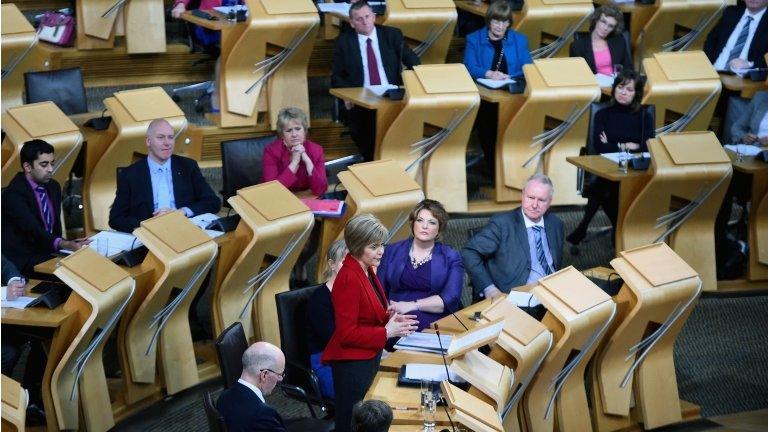
- Published26 November 2014
- Published26 November 2014
- Published26 November 2014
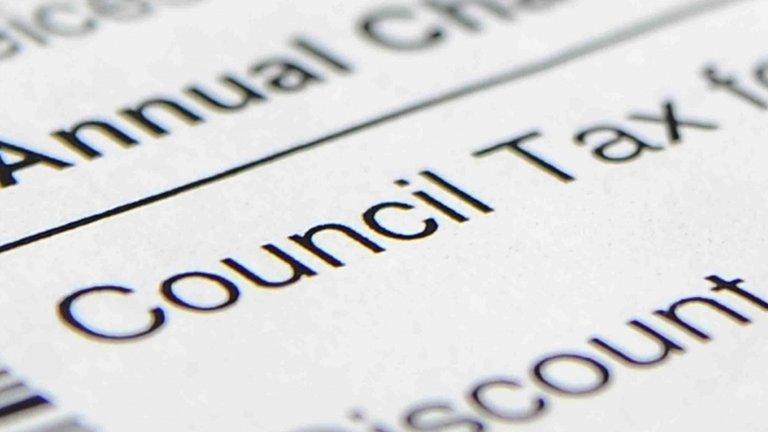
- Published21 November 2014
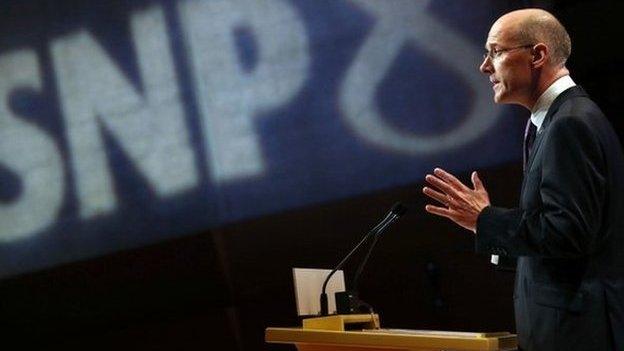
- Published21 November 2014
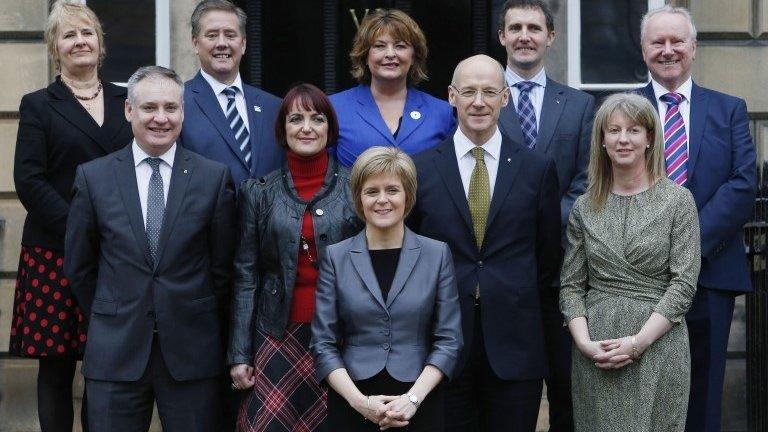
- Published19 November 2014
